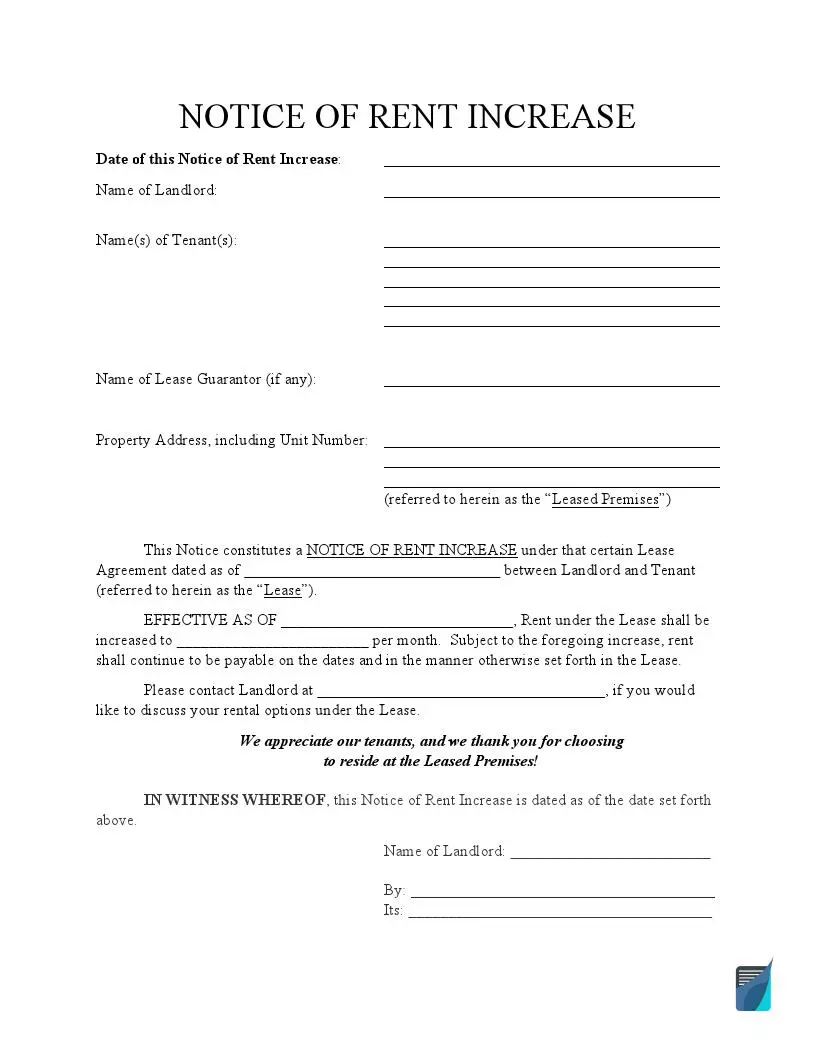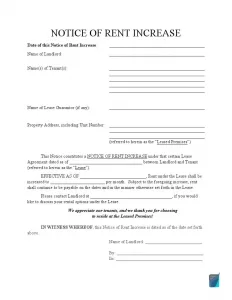Rent Increase Notice Templates
A notice of rent increase is a document designed for notifying tenants about an increase in property rent within a specific period of time. Since rent control exists only in a few jurisdictions, landlords are generally allowed to raise the rent without any limits on the amount. However, it is recommended to let tenants know about such a decision within specific time frames.
You can use our rent increase notice form to create your document and successfully inform your tenant about the increased rent. You can also take advantage of our step-by-step guidelines to prepare all the necessary documentation, including a rental agreement.

Build Your Document
Answer a few simple questions to make your document in minutes
Save and Print
Save progress and finish on any device, download and print anytime
Sign and Use
Your valid, lawyer-approved document is ready
Why a Landlord Might Increase the Rent
Although there are usually no limitations for landlords in a desirable amount of lease changes, you should always use a common-sense approach and consider that such financial changes can deprive you of a diligent tenant. Therefore, the new rent amount should be justified and have a reasonable explanation, such as:
- Specific terms of the lease agreement (sometimes, a periodic raise of the rent is defined in the lease agreement);
- Real estate improvements (capital improvements create better living conditions and lead to a higher market value of the rental property);
- Neighborhood development (landlord can increase rent due to better transport infrastructure or new job opportunities in the area);
- Higher monthly rent tendencies in the area;
- Real estate market demand increase;
- Higher property taxes, insurance premiums, or condominium association dues.
When Is It Forbidden to Increase the Rent?
There can be a range of reasonable explanations to change the rental terms of use; nevertheless, landlords may face some important restrictions on this issue, such as the following:
- For a periodic lease, such as a year-to-year or month-to-month rental agreement, landlords are not allowed to raise the rent cost without sending to tenants a hard copy of a written notice within a specific period of time. As a general rule, it should be at least 30-days notice (sometimes, 45 or 60 days).
- When it comes to a fixed-term lease agreement, landlords are forbidden to change rent costs until the end of the lease (if it’s not defined otherwise in the landlord-tenant agreement).
- In a few jurisdictions, local laws contain restrictions on the amount or period of a rent increase. Such restrictions were also connected with the COVID-19 pandemic. Some US localities were prohibited from hiking rents during the quarantine. For example, San Francisco had a Temporary moratorium on rent increases for rent-controlled tenancies from April to October 2020.
- It is forbidden to increase the lease amount as retaliation or discrimination against a tenant. “Retaliatory actions” occur when a landlord raises a lease cost or sends an eviction notice to a tenant in response to exercising legal rights (for example, requesting necessary repairs or complaining to the authorities about problems in the unit). The state’s department of consumer affairs usually clarifies the characteristics of retaliatory actions.
How to Calculate the Rent Increase
Frequently, landlords raise costs by 3–5% percent. If rent increases, a tenant can decide to change the apartment to a more affordable one. For this reason, when deciding to raise rent costs, landlords must do careful research, which includes:
- Looking through the agreement’s terms;
- Analyzing local laws and rent regulations to understand whether you are limited in the lease amount you can raise;
- Looking into the local real estate market. It would be especially useful if you haven’t increased your rent for a few years. During this time, the rental market demand could significantly increase, and the neighborhood infrastructure could become more resilient and valuable;
- Comparing your apartment to similar ones in the area. Such services as Rentometer and Zillow can help you with this task, or you can look through apartments for rent, for example, using the Apartments.com platform.
Rent Increase Notice Laws by State
| STATES | MIN. NOTICE PERIOD |
| Alabama | No Statute |
| Alaska | 30 Days |
| Arizona | No Statute |
| Arkansas | No Statute |
| California | 30 OR 60 Days |
| Colorado | No Statute |
| Connecticut | No Statute |
| Delaware | 60 Days |
| Florida | No Statute |
| Georgia | No Statute |
| Hawaii | 45 Days |
| Idaho | 15 Days |
| Illinois | No Statute |
| Indiana | 30 Days |
| Iowa | 30 Days |
| Kansas | As Stated in the Rental Agreement |
| Kentucky | No Statute |
| Louisiana | No Statute |
| Maine | 45 Days |
| Maryland | No Statute |
| Massachusetts | 30 Days |
| Michigan | No Statute |
| Minnesota | Period of Rent plus 1 Day |
| Mississippi | No Statute |
| Missouri | No Statute |
| Montana | 15 Days |
| Nebraska | As Stated in the Rental Agreement |
| Nevada | 45 Days |
| New Hampshire | 30 Days |
| New Jersey | 30 Days |
| New Mexico | 30 Days |
| New York | No Statute |
| North Carolina | No Statute |
| North Dakota | 30 Days |
| Ohio | No Statute |
| Oklahoma | No Statute |
| Oregon | 30 Days |
| Pennsylvania | No Statute |
| Rhode Island | 30 Days |
| South Carolina | No Statute |
| South Dakota | 30 Days |
| Tennessee | No Statute |
| Texas | No Statute |
| Utah | No Statute |
| Vermont | 60 Days |
| Virginia | No Statute |
| Washington | 30 Days |
| West Virginia | No Statute |
| Wisconsin | 28 Days |
| Wyoming | No Statute |
How to Make the Rent Increase Legal
If your decision to raise the rent is final and justified, we’ve prepared the guidelines to facilitate the process.
Step 1. Analyze the agreement
The first thing you should do is analyze the rental agreement’s terms of use. Sometimes, the agreement provides an obligatory raise of the rent while the lease is in effect or after a certain period of time.
Step 2. Define a fair amount of the increase
Try to come up with a fair rent increase. As mentioned above, a nice way to justify a new lease term is to do rigorous research, considering the real estate market demand, local rental conditions, and average monthly rent for similar property in your area. Landlords must also comply with the rent increase laws while calculating their rent.
Step 3. Follow the state laws
It is important to comply with the state regulations since some jurisdictions have rent stabilization laws. In particular, rent control is adopted in California, New Jersey, Maryland, New York, Oregon, and Washington D.C. Even if there is no state statute on the issue, it is recommended to always provide a tenant with a written rent increase notice at least a month prior to the increase date.
Step 4. Write and send the notice
After preparing all the necessary information, you need to write and send the notice according to legal requirements. When writing a rent increase notice, be friendly with your tenant. You can even add a part of your research to justify your decision. When sending the notice, it is highly recommended to use certified mail since you will get a mailing receipt. If you want to send the notice by email, back it up with a printed copy of the letter.
What If a Landlord Increases the Rent Without a Notice
Unless lease stabilization laws apply, as a landlord or property manager, you are allowed to periodically increase your rent. However, make sure to inform your tenant about such changes with a rent increase letter containing a written notice. Not sending such a letter can lead to unpleasant consequences for both the landlord and the tenant.
Landlord’s perspective
If a landlord does not send a rent increase letter or notifies the tenant about the future changes only verbally, the rent increase may not be qualified as legal. Therefore, a landlord risks being subjected to a lawsuit for a possible retaliation or discrimination against the tenant and having to pay a law firm to settle a dispute. In addition, the landlord loses an opportunity to sign a new lease agreement with a loyal tenant and get a higher rental income.
Tenant’s perspective
If tenants do not receive a rent increase letter, they can decide to file a lawsuit against the landlord. Consequently, they also risk paying expensive fees to a law firm to sue the landlord for a possible retaliation or discrimination act. Apart from legal actions, tenants can lose time to find a more suitable place to live in.

Filling Out a Notice of Rent Increase
A notice of rent increase provides a landlord with legal grounds for increasing their rental payment. The main steps to prepare such notice are the following:
Step 1. Enter the contact information
At the top of your document, you should enter the date of the rent increase notice. Then you have to name the landlord, tenant(s), lease guarantor (if any), and indicate the property address, including the unit number.
Step 2. Indicate the new rent amount
Make sure to enter the previous and increased amounts of rent, specifying the reasons for the increase. You should also indicate under which rental agreement the notice is constituted as well as its effective date.
Step 3. Sign, print, and send the notice
After preparing the document, you should sign and print it. You can deliver the notice to your tenant in one of the following ways:
- by regular mail (postage prepaid)
- by certified mail (with a mailing receipt returned)
- personally (a hand-delivered letter)
Make sure to deliver a hard copy of the letter because it creates reliable records of the documentation. In some states, it is obligatory to send the notice specifically via certified or registered mail to ensure that the document is delivered to the tenant.
Rent Increase Letter Sample
Rent increase is not a very pleasant event for tenants, so you should inform them as smoothly as possible. Clearly, the letter should be formal, but we advise you to write it in a friendly manner, especially if you have a positive relationship with your tenants. Note that a rent increase sometimes leads to a security deposit increase. You should warn your tenant about such a possibility too. Feel free to use the letter sample below when writing your rent increase notice.
Elizabeth Smith 8305 Grand River Ave Detroit, Michigan 48204 RE: Rent Increase Notice Date: November 23, 2020 Dear Mrs. Smith,
I am writing to inform you that the rent for the unit located at 8305 Grand River Ave, Detroit, Michigan (property address) will be increased due to recent capital improvements to the home’s exterior (reasons for increasing rent).
I really appreciate you being my tenant and hope you will understand the decision.
Please, let me remind you that your current lease will be over on December 31, 2020 (date). The new monthly rent will raise from $750 to $825 (amount) after that date. Please, consider that the other terms of our agreement will not change (including the amount of security deposit).
Whether you want to continue the current month-to-month lease or would like to sign a new agreement, this new amount is required in either case. Please, let me know about your decision by responding to this letter within 30 days.
If you would like to discuss the new terms of the rental agreement, please call at 258-212-7648 (phone number) or contact me via email at johndou@andproperties.com.
Sincerely,
John Douglas, Owner of the Properties
